Category Archives: Book Reviews
Book Review: Kind Lies, a Mystery
We recently exhibited our books at the Lancaster Community Library in Kilmarnock, VA, and I traded books with other vendors there. As I usually do, I signed my book to Abbot Lee Granoff, author of Crowns of Gold with the line, “Enjoy the adventure.” Later, I read the note he wrote in signing his book to me. “Enjoy the adventure.” Great minds, etc. I’ll print a review of his book later.
I also traded books with Ann Eichenmuller, whose book, Kind Lies, features a woman who lives alone on a sailboat at a marina on the Rappahannock River. It is a mystery. The book I gave her was my psychological suspense novel called The Two-Sided Set-Up, in which my protagonist lives alone on a trawler at a marina on the Rappahannock.
HISTORY LESSONS FROM PACHINKO
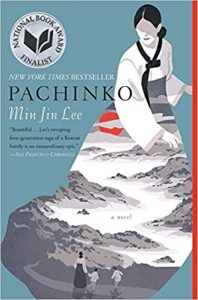
Min Jin Lee’s novel Pachinko opens with this sentence: “History has failed us, but no matter.” While Lee’s emphasis in the novel is aimed squarely on the “us” in that sentence, I was captivated by the history she explores, largely because my knowledge of it was sorely lacking.
Pachinko
begins in Yeongdo, Korea, in 1910, the year the country was annexed by the
Empire of Japan after years of war and intimidation. During the occupation that
followed, Japan took over Korea’s labor and land and waged war on its culture.
Japanese families were given land in Korea, where they chopped down trees by
the millions and planted non-native species. Korean workers were forced to work
in Japan and its other colonies.
Interview with Running Breathless author Morey Kogul

These days many of us are glued to the news as conflicts near and far are reported with up to the minute details. Can you imagine then how it must have felt to residents of Dubno in Soviet occupied Poland in June 1941 to hear rumors that Germany was about to invade? Jewish families in particular had few if any choices to assure their survival. In one family a young man decided to ride his bicycle to a near-by town to learn what he could. For Wolf Kogul that was the beginning of years struggling to survive war, tragic loss and future guilt.
Each story of that time adds
concrete knowledge of those terrible years, bringing the truth of specificity
that history books can only generalize about.
Book Review: First Cosmic Velocity
TAYARI JONES AND AN AMERICAN MARRIAGE
I’ve been a fan of the writing of Tayari Jones since I read her novel Silver Sparrow several years ago, so I approached her new novel, An American Marriage, with a great deal of happy anticipation. I was not disappointed. But then numerous awards organizations can’t be wrong. Among the many honors An American Marriage has won since its publication in 2018 are Oprah’s Book Club selection, nomination by the American Booksellers Association for the 2019 Indies Choice Book of the Year Award, selection for the 2019 Women’s Prize for Fiction shortlist, and selection as a finalist for the Los Angeles Times book prize.
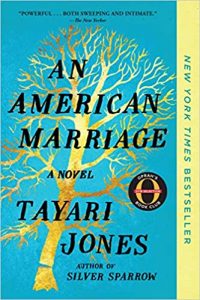
All of these groups had various reasons for honoring An American Marriage, but for me the joy of reading the novel sprang from two main sources: Jones’s fresh approach to what could have been a hackneyed story and the beautiful simplicity of her writing.
Getting Re-acquainted with P.D. James
P.D. James, The Black Tower (1975)
I hadn’t read a P.D. James novel in some years, but came across this one and I’m glad I read it. For those who are not familiar with her, James’ reputation was stellar. (Her dates are 1920-2014.) On the front cover Time Magazine is quoted as calling her “The reigning mistress of murder.” Two British papers are quoted on the back describing The Black Tower “a masterpiece” and James is labelled the “greatest contemporary writer of classic crime.”
James wrote a series of fourteen crime novels featuring a
reserved male detective by the name of Adam Dalgliesh. He’s the opposite of
James Bond. He uses deduction, perseverance and a dedication to an often
thankless job to ferret out the criminal.
Book Reviews: WHITE ELEPHANT and MIRACLE CREEK
Can Moderns find Happiness? A Review of Aminatta Forna’s Novel
Aminatta Forna, Happiness (2018)
Happiness is a story of subtle changes. Aminatta Forna’s protagonists, an African psychiatrist specializing in trauma and an American naturalist, meet by accident on a bridge in London. Coincidence repeats and a relationship is built over a relatively short time period of time based on open-mindedness, shared natures, and eventually physical attraction, but what is this story about? Forna seeks to keep us interested in the slow evolution of these characters’ relationship by weaving each person’s past in with present events––which include the search for a lost child, dealing with the needs of a former lover institutionalized for dementia, and being tuned into a city populated by foreign nationals, foxes and escaped pet birds.
At one point, the
psychiatrist, whose name is Attila, suggests happiness might be found in a
village in Cuba which is cut off from that island’s poor infrastructure.
Book Review: A Light of Her Own
FOR THE LOVE OF PEOPLE, BOOKS, HISTORY, AND ADVENTURE
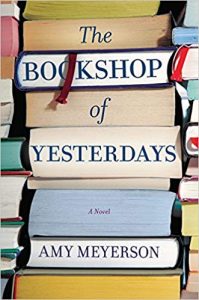
A good novel delves deep into the psyches of its characters while also telling a story that’s intriguing enough to keep the reader turning pages. The Bookshop of Yesterdays by Amy Meyerson succeeds on both fronts by weaving three different types of stories about the same people into a seamless whole.
First,
The Bookshop of Yesterdays is an
adventure story developed through a clever scavenger hunt. For the first twelve
years of her life, Miranda Brooks spends happy hours following the clues to scavenger
hunts designed by her Uncle Billy. Then, after a hunt that leads Miranda to the
puppy she’s always wanted but her mother refuses to let her keep, Uncle Billy
disappears, and she doesn’t hear from him again until just before his death 16
years later.
The Origins of Today’s Detective Genre Fiction: A Review of Dennis Dooley’s Dashiell Hammett
Back in the day, most undergraduates took at least one English literature course. Sometimes it was Shakespeare, 19th century English novelists, or the American Transcendentalists. I took a modern novel course in which we read James Joyce’s Ulysses, Thomas Mann’s Magic Mountain, Remembrance of Things Past, and several others––a heavy load for a one semester course. The key lesson in all of these courses is that while it’s possible to read solely for enjoyment additional layers of understanding are available when you analyze and compare each work with others by the same author as well as books by other writers.
A few decades ago the Frederick Ungar Publishing Company launched a line of books about genre authors called Recognitions.
How to Write an Undramatic but Engaging Novel
I’ve written before (in Two Ways to Write a Novel, parts I and II, in this column) about a non-cinematic kind of novel, one which tells more than shows, that prioritises interiority and language over action and dialogue. Colm Toibin’s novel The Master (2004) about Henry James, strikes me as one that exemplifies that approach. In any case, how could you make James’s life dramatic? He had no openly sexual relationships. He lived through the Civil War, and two of his brothers fought in it, but he declined to do so. He travelled in Europe and knew many famous figures, but was apparently so discreet and reticent by nature that he seldom quarrelled or even disagreed with anyone. In fact, his life seems to have consisted mainly in observing the lives of others, and using those observations as grist for his fictional mill.
When Historical Fiction Becomes Allegory: Colson Whitehead’s The Underground Railroad
The Underground Railroad tells the story of Cora, a young slave, who escapes a Georgia plantation hoping to hop a ride to freedom on the Underground Railroad. What she discovers is that freedom’s journey has many obstacles. At the end of the story, after suffering psychological and physical harm along the way, we find her continuing her flight still hoping to reach freedom’s promised land.
This novel is an allegory of sorts. It begins offering a harsh portrait of life under slavery; but when Cora leaves the plantation, she moves into an imagined world, still harsh, meant it seems to teach the reader about the dangers of placing one’s hopes on whites.
Cora is transported north, as the title implies, on the Underground Railroad.
Book Reviews: Recent Releases Ripe for Reading
One of the great joys of participating in the D.C. area writing community is getting to know so many of the exceptionally talented authors who call the area home. An added bonus is learning some of the backstory behind their work, including what it took to bring to publication. Here are two books from D.C. writers that were just released in October.
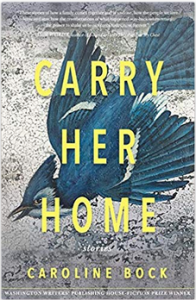 Carry Her Home, Caroline Bock, Washington Writers Publishing House, 2018, 218 pp.
Carry Her Home, Caroline Bock, Washington Writers Publishing House, 2018, 218 pp.
This collection of flash fiction and longer stories, many of which are inter-related, is fully, deliciously unexpected. From the first tiny but densely meaningful story, “The Understanding”, and the second, “O, Tomato,” which reads like prose poetry, it doesn’t take long to catch the rhythm of the stories and a sense of direction, and to realize that what remains unstated carries as much weight as what is on the page.
In Pursuit – The Hunt for the Beltway Snipers
If you lived in the D.C. Metro Area in October, 2002, you remember the terror you felt as the Beltway Snipers killed people randomly on the street, in a store, filling gas, loading groceries into a car—17 killed in all with 10 wounded. I was afraid, as we all were, to walk from my car to my house or anywhere else. If you were at the gas pump, you stooped to hide behind your car. You ran zigzaggedly into a store, kept your kids home from school, and prayed you wouldn’t be the next victim.
So this month I had the pleasure of being a panelist at the Mechanicsburg, PA, Mystery Book Shop. I sat next to  David Reichenbaugh, also a panelist and author of In Pursuit: The Hunt for the Beltway Snipers.
David Reichenbaugh, also a panelist and author of In Pursuit: The Hunt for the Beltway Snipers.
A Book for Now: Behold the Dreamers by Imbolo Mbue
 Imbolo Mbue’s novel Behold the Dreamers has been on my mind as I’ve read about the thousands of migrants from Central America walking the long miles toward the United States. The fictional story about Jenda Jonga, an immigrant from Cameroon, could be the story of so many people who see America as the promised land. One of America’s central myths is that of the poor immigrant who amasses riches. Mbue’s take on it is powerful and original.
Imbolo Mbue’s novel Behold the Dreamers has been on my mind as I’ve read about the thousands of migrants from Central America walking the long miles toward the United States. The fictional story about Jenda Jonga, an immigrant from Cameroon, could be the story of so many people who see America as the promised land. One of America’s central myths is that of the poor immigrant who amasses riches. Mbue’s take on it is powerful and original.
Mbue herself is the embodiment of the immigrant success story. In 1998, an aunt sponsored her to come from her native Cameroon to study at Rutgers University. She went on to get a master’s degree from Columbia University. Behold the Dreamers, her debut novel, landed a million-dollar advance.
Thriller, Mystery or Ghost Story: How Should We Label Elizabeth Brundage’s All Things Cease to Appear?
When Stephen King writes a blurb for a novel, readers take notice. When a book is reviewed in the New York Times Book Review section, readers take notice. Let’s look at how Elizabeth Brundage’s fourth novel, All Things Cease to Appear, which was published in 2016, is being received by the reading public.
All Things has earned over 7,000 ratings and 1,000 reviews on Goodreads. That is very good, yet the book scores only 3.72 (out of 5)––not what one might expect. On Amazon, it does a little better with a 4.1 score, but from only 300 reviews.
What are the chief objections to the novel among Amazon and Goodreads reviewers? First, and least important in my opinion, is that she does away with quotation marks.
GUEST BLOGGER DAVID LEDDICK: I’M NOT FOR EVERYONE. NEITHER ARE YOU.
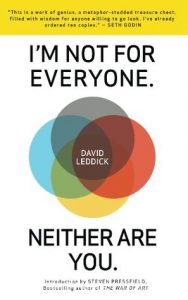 “This is a work of genius, a metaphor-studded treasure chest filled with wisdom for anyone willing to go look,” says author and entrepreneur Seth Godin of David Leddick’s little gem I’m Not for Everyone. Neither Are You. A few chapter-ette titles will give you the idea. “There is no lasting comfort in a safe landing. Better to stay in flight…and embrace impermanence.” “In confrontation, never answer the way people expect you to.” “He was a man and I like that in a person.” (Leddick is gay, remember.) “He doesn’t want to give up everybody for somebody.” This chapter-ette begins by saying, “This applies more to men than to women. And not just gay men.” “A child says nothing matters, but it takes an adult to say it doesn’t matter that nothing matters.”
“This is a work of genius, a metaphor-studded treasure chest filled with wisdom for anyone willing to go look,” says author and entrepreneur Seth Godin of David Leddick’s little gem I’m Not for Everyone. Neither Are You. A few chapter-ette titles will give you the idea. “There is no lasting comfort in a safe landing. Better to stay in flight…and embrace impermanence.” “In confrontation, never answer the way people expect you to.” “He was a man and I like that in a person.” (Leddick is gay, remember.) “He doesn’t want to give up everybody for somebody.” This chapter-ette begins by saying, “This applies more to men than to women. And not just gay men.” “A child says nothing matters, but it takes an adult to say it doesn’t matter that nothing matters.”
Historical Research: Mining for Gold
I am sometimes asked to speak on historical research for writers because of my two historical novels, Shadow of the Rock and In Rembrandt’s Shadow. I visited libraries and special collections, traveled to sites in Florida, St. Thomas, Morocco, and Gibraltar, consulted maps and long out-of-print books, and interviewed historians and others to collect the information I needed. It was quite an adventure.
So I pay attention to the resources used in offbeat research and not necessarily by academics. Recently, a slim book 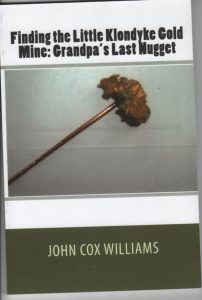 called Finding the Little Klondyke Gold Mine: Grandpa’s Last Nugget by John Cox Williams crossed my desk. It’s the author’s story of searching for and finding his grandfather’s gold mine. He started with a vague memory of his mother showing him a nugget from the mine.
called Finding the Little Klondyke Gold Mine: Grandpa’s Last Nugget by John Cox Williams crossed my desk. It’s the author’s story of searching for and finding his grandfather’s gold mine. He started with a vague memory of his mother showing him a nugget from the mine.